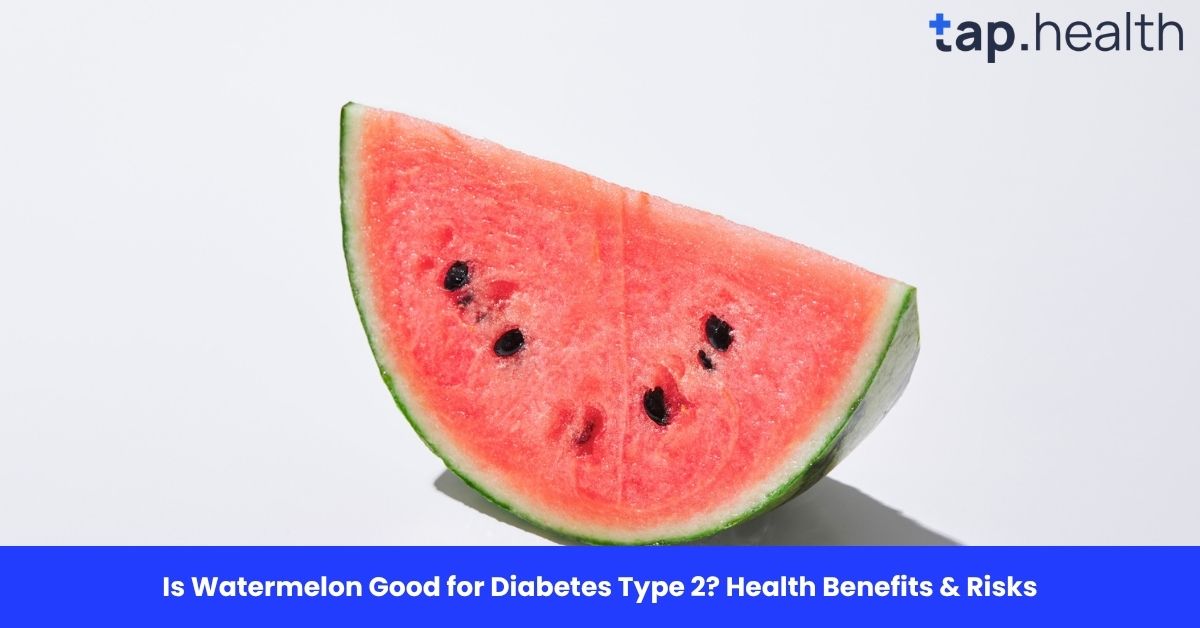Watermelon, a juicy and refreshing fruit, is a popular choice during the summer months. But for those living with diabetes type 2, the question arises: Is watermelon good for diabetes type 2? This is a common concern due to the fruit’s natural sugar content and its potential impact on blood sugar levels. While watermelon is often viewed as a healthy snack, diabetics need to carefully consider the fruit’s glycaemic index (GI), nutritional value, and how it fits into a balanced diet. In this article, we will explore whether watermelon can be safely consumed by individuals with diabetes type 2, its potential health benefits, risks, and the best ways to enjoy it.
What is Diabetes Type 2?
Before diving into the relationship between watermelon and diabetes type 2, it’s essential to understand what diabetes type 2 is. Type 2 diabetes is a chronic condition that affects how the body processes blood sugar (glucose). Unlike type 1 diabetes, where the body does not produce insulin, in type 2 diabetes, the body does not use insulin properly, leading to insulin resistance. Over time, this can cause high blood sugar levels, which can damage organs and lead to complications like heart disease, nerve damage, and kidney problems.
Managing blood sugar levels is crucial for people with type 2 diabetes. This includes careful monitoring of the foods and beverages consumed, as certain foods can cause blood sugar spikes. Therefore, when considering fruits like watermelon, it’s important to look at their glycaemic index (GI) and glycaemic load (GL), which give an indication of how they affect blood sugar.
Watermelon: Nutritional Breakdown
Watermelon is made up of about 90% water, making it a highly hydrating and low-calorie fruit. A typical serving of watermelon provides essential vitamins and minerals that can support overall health, including vitamin C, vitamin A, potassium, and magnesium.
Here’s a closer look at the nutritional breakdown of watermelon per 100 grams:
- Calories: 30
- Water Content: 90%
- Carbohydrates: 7.6 grams
- Sugar: 6.2 grams (primarily fructose and glucose)
- Fibre: 0.4 grams
- Protein: 0.6 grams
- Vitamins and Minerals:
- Vitamin C: 8.1 mg (provides 10% of the daily recommended intake)
- Vitamin A: 28 µg
- Potassium: 112 mg
- Magnesium: 10 mg
While watermelon is low in calories, it’s important to note that its sugar content may affect blood sugar levels. However, the high water content in watermelon dilutes the sugar, which can potentially make it easier for the body to process, especially when eaten in moderation.
Glycaemic Index (GI) and Glycaemic Load (GL) of Watermelon
Glycaemic Index (GI)
The glycaemic index (GI) measures how quickly foods cause an increase in blood glucose levels. Foods with a GI of 55 or less are considered low GI, those with a GI of 56–69 are medium GI, and those with a GI of 70 or more are high GI. Watermelon has a GI of 72, placing it in the high-GI category. This means that, in theory, watermelon can cause a quick rise in blood sugar when consumed in large quantities.
Glycaemic Load (GL)
The glycaemic load (GL) is a more accurate measure of how a portion of food affects blood sugar. The GL takes into account both the GI of a food and the amount of carbohydrates it contains. For watermelon, the GL is relatively low because of its high water content, which reduces the overall carbohydrate density.
For example, a typical serving of 100 grams of watermelon has a GL of about 5, which is considered low. This means that while watermelon may cause a quick spike in blood sugar (due to its high GI), the actual effect on blood sugar levels is not as significant when consumed in moderate portions.
Is Watermelon Safe for People with Diabetes Type 2?
1. Moderation is Key
While watermelon has a high GI, its low GL makes it relatively safe for people with diabetes type 2 when eaten in moderation. Eating small portions (around 100 grams or a half-cup of diced watermelon) can help keep blood sugar levels in check without causing major spikes.
2. Hydration and Weight Management
Watermelon is a great hydrating fruit due to its high water content. Staying hydrated is essential for diabetes management, and watermelon can help with hydration while being low in calories. This makes it a good choice for diabetics who are also looking to maintain a healthy weight.
3. Rich in Antioxidants
Watermelon contains lycopene, a powerful antioxidant that can help reduce inflammation and protect against heart disease. Since heart disease is a common complication of diabetes, including watermelon in your diet may have cardiovascular benefits. Lycopene has also been linked to improving insulin sensitivity, which is a critical factor in managing diabetes.
4. Blood Sugar Control
Watermelon’s ability to raise blood sugar levels quickly may be concerning for diabetics. However, the fruit’s glycaemic load is low, which means it won’t cause a significant blood sugar spike if consumed in moderation. Pairing watermelon with a source of protein or healthy fats (like nuts or a small serving of cheese) can help slow the absorption of sugar into the bloodstream, reducing the likelihood of a rapid increase in blood sugar.
Potential Risks of Eating Watermelon for People with Diabetes Type 2
While watermelon can be a healthy snack, there are some risks associated with eating it if you have type 2 diabetes, especially if consumed in large quantities or without proper blood sugar management.
1. Blood Sugar Spikes
Due to watermelon’s high glycaemic index, eating large portions can lead to rapid blood sugar increases. Diabetics who consume large quantities of watermelon without paying attention to their overall carbohydrate intake may experience significant blood sugar spikes, which can negatively impact diabetes management.
2. Lack of Fibre
Watermelon is relatively low in fibre, which is essential for slowing down the absorption of sugar into the bloodstream. Diabetics should aim to balance watermelon with high-fibre foods (like vegetables or whole grains) to ensure a more gradual rise in blood sugar levels.
3. Overconsumption of Fruit Sugars
While watermelon is low in calories, it’s important not to overconsume fruit, especially for diabetics trying to manage their sugar intake. Eating too much fruit, including watermelon, can add up to a significant amount of sugar and carbohydrates, which may affect blood sugar levels.
Also Read this: How Many Calories in a Whole Watermelon?
How to Safely Include Watermelon in a Diabetes-Friendly Diet
If you’re living with diabetes type 2 and want to enjoy watermelon, there are ways to safely include it in your diet:
- Stick to Small Portions: Limit yourself to about 100 grams (half a cup) of watermelon per serving.
- Pair with Protein or Healthy Fats: To prevent blood sugar spikes, pair watermelon with a source of protein (such as Greek yogurt) or healthy fats (such as almonds).
- Balance with Fibre-Rich Foods: Include fibre-rich foods, like leafy greens or whole grains, in your meal to slow the absorption of sugar.
- Avoid Sugary Additions: Skip adding sugar, syrups, or sweetened toppings to your watermelon. Enjoy it in its natural, fresh state.
Key Takeaways
- Watermelon is safe for diabetics in moderation due to its low glycaemic load, but care must be taken with portion sizes.
- Pairing watermelon with protein or healthy fats can help moderate blood sugar levels and prevent spikes.
- The fruit is hydrating, low-calorie, and rich in antioxidants, making it a beneficial snack in a diabetes-friendly diet.
- Portion control is essential to prevent the quick sugar spike caused by watermelon’s high glycaemic index.
FAQ: Is Watermelon Good for Diabetes Type 2?
Q: Is watermelon safe for people with type 2 diabetes?
Yes, watermelon can be safe for diabetics in moderation. Its low glycaemic load makes it a viable option, but portion control is key to avoid blood sugar spikes.
Q: How much watermelon can a diabetic eat?
A diabetic can eat around 100 grams (about half a cup) of watermelon without significantly impacting blood sugar levels. Larger portions may cause spikes in blood glucose.
Q: Does watermelon raise blood sugar levels?
Watermelon has a high glycaemic index, which means it can raise blood sugar levels. However, due to its low glycaemic load, it won’t cause large spikes if eaten in small portions.
Q: Can I eat watermelon at night if I have diabetes?
Yes, you can eat watermelon at night in moderation. Just be mindful of portion sizes and pair it with protein or healthy fats to help stabilise blood sugar levels.
Q: How can I enjoy watermelon without spiking blood sugar?
To avoid blood sugar spikes, eat small portions of watermelon and combine it with protein or healthy fats, such as nuts, yogurt, or cheese.
Q: What are the health benefits of watermelon for diabetics?
Watermelon is rich in antioxidants like lycopene, which may help reduce inflammation and improve insulin sensitivity, making it a beneficial fruit for diabetics when eaten in moderation.
Q: Is watermelon a good fruit for weight management in diabetics?
Yes, watermelon is low in calories and can be a good option for diabetics looking to manage their weight. Its high water content helps with hydration without adding excessive calories.



